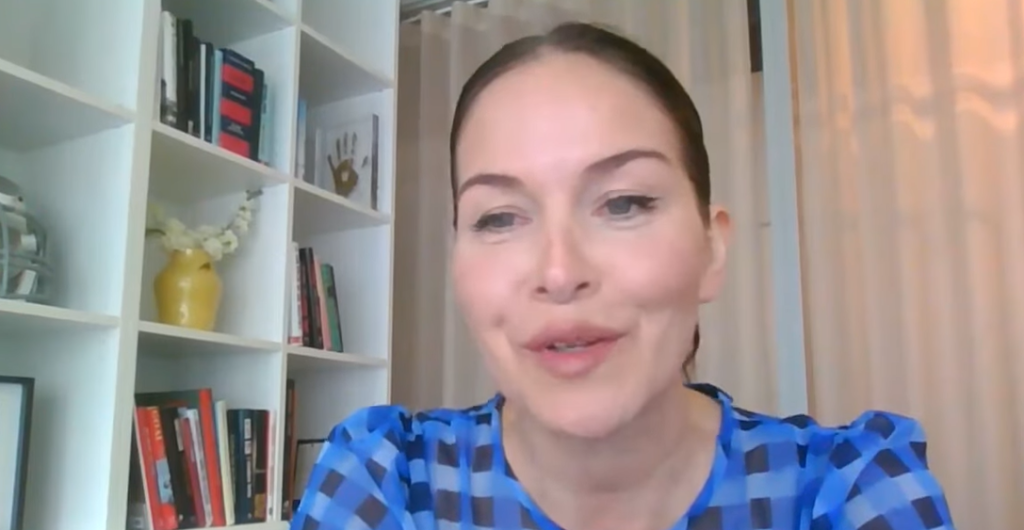Known for her multi-layered stage and screen roles, Julia Dufvenius has built an impressively diverse career while upholding a close-knit and private family life. Her son Fritiof Eric Vide Lo Wollter, whose existence embodies both heritage and hope, is at the heart of this more subdued story. Fritiof is the intimate continuation of a family rich in cultural significance, having been born into a home where rehearsal spaces and acting scripts blend with bedtime rituals.
When Julia married actor Christopher Wollter in 2005, two artistic trajectories came together, enhanced by Christopher’s family connection to the well-known Swedish actor Sven Wollter. Together, they have established a family that combines traditional and modern values, bringing up their son Fritiof and daughter Tilde in an environment that strikes a balance between creativity and cautious shielding from overzealous publicity. This decision, which is remarkably similar to how celebrities like Cate Blanchett have protected their kids, is especially advantageous because it enables them to forge identities separate from their parents’ limelight.
Despite the interest in celebrity children, Julia and Christopher have always opted for secrecy, making sure their son’s upbringing is influenced by individual liberty rather than social pressure. This self-control works incredibly well to protect a child from being scrutinized. Like Zoë Kravitz or Maya Hawke, who went on to define themselves in the creative industries, Fritiof may eventually have to balance his personal ambitions with his family’s legacy, but for the time being, his parents allow him to explore.
Table: Julia Dufvenius – Personal Life and Family
| Category | Details |
|---|---|
| Full Name | Elin Julia Dufvenius Wollter |
| Date of Birth | October 8, 1975 |
| Birthplace | Gothenburg, Sweden |
| Profession | Actress, Writer |
| Spouse | Christopher Wollter (actor, married June 18, 2005) |
| Children | Daughter: Tilde Wollter; Son: Fritiof Eric Vide Lo Wollter |
| Famous Relatives | Sven Wollter (great-uncle to Christopher Wollter, Swedish actor) |
| Breakthrough Role | Glappet (1997, SVT miniseries) |
| Notable Work | Saraband (2003), Heder (2019), multiple Royal Dramatic Theatre roles |
| Recognition | Respected stage and screen actress, advocate for equity in the arts |
| Reference Link | https://en.wikipedia.org/wiki/Julia_Dufvenius |

Julia herself frequently combines her artistic philosophy with her thoughts on family. She became a powerful voice during Sweden’s #MeToo movement, demanding accountability from theater organizations and connecting her activism to the principles she wanted to teach her kids. This link between private accountability and public bravery shows a very clear understanding that legacy is not just artistic but also moral. This upbringing offers her son guidance that goes well beyond the spotlight.
Being a parent in an artistic family frequently accentuates the differences between glitz and everyday life. The Swedish press once reported that Christopher had gone overseas for filming soon after Fritiof was born, a situation that is common for families whose domestic stability is threatened by work obligations. However, Julia has made it clear that family is the foundation of even the busiest of careers by emphasizing the value of small, everyday details, such as shared meals and spontaneous moments. Her viewpoint is in line with that of well-known celebrities like Nicole Kidman and Penélope Cruz, who have also stated that their families provide them with stability amidst the upheaval of their acting careers.
The larger story of actors’ offspring frequently mirrors society’s interest in cultural inheritance. His ancestry links Fritiof symbolically to Sweden’s theater and film history, regardless of whether he ultimately decides to pursue acting, music, or another field. This is similar to the continuity observed in artistic dynasties like the Skarsgårds in Sweden or the Redgraves in Britain. Inspiring and demanding, it also draws attention to the cultural expectation that children of creatives will either expand or redefine their parents’ influence.
From her breakthrough performance in Glappet to her roles in Saraband and Heder, Julia’s body of work demonstrates her dedication to portraying characters with depth and resiliency. Offstage, she exemplifies another kind of artistry in her role as Fritiof’s mother: fostering independence, fostering strength, and forming values. The mystery surrounding her son piques the interest of admirers; for Julia, it protects her son’s opportunity to develop without being prematurely labeled. This strategy has significantly enhanced the public’s perception of her work-family balance, demonstrating that privacy and celebrity can coexist.
When examining more general cultural patterns, Fritiof’s tale reflects a recurrent theme: society’s tendency to project its aspirations and values onto the offspring of well-known individuals. European media frequently questions whether children like Fritiof will continue their family’s creative legacy, much like Hollywood closely examines every action of celebrity children. In addition to their personal biographies, these young people are fascinating because of what they stand for in terms of change, legacy, and continuity.
The most notable aspect of Julia’s management of her family life is the harmony between candor and discretion. Her role as a mother has never been sensationalized, but she has also never hidden the significant impact her children have on her perspective. This well-rounded strategy is very adaptable and provides a template for other public personalities who want to safeguard their kids without sacrificing their authenticity. Instead of being characterized by the public’s desire for stories, her son will grow up with a foundation of stability, values, and love.


